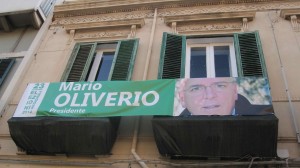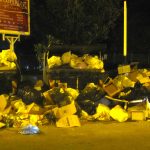ITALY’S SEXIEST MAYOR
“I don’t find him sexy.”
“Who?”
“The mayor. The TV’s saying he’s the sexiest mayor in Italy. I don’t know. He doesn’t transmit ‘sexy’ to me.” The 70-year-old woman wanted my opinion.
“Well, at the very least, he’s unquestionably amongst the best looking mayors.”
Elvira wasn’t convinced. He wasn’t her type.
The new mayor of Reggio Calabria is a handsome young man – no doubt about it. However, the jury is apparently still out vis-à-vis his sex appeal. The jury is also undecided with regard to his future leadership of Calabria’s largest city. Will he know how to maneuver within the political quagmire? With whom will he surround himself? Will he select the right people?
His name is well known in Calabria. His father, Italo Falcomatà was mayor of Reggio from 1993 to 2001, so well liked that the city’s beautiful seaside promenade was named after him. Dying prematurely of leukemia, Falcomatà Senior left behind his son Giuseppe, Peppe for short, who at the young age of 31 has the formidable task of not only filling his father’s shoes, but of governing a city in which the former administration was dissolved for suspected ties to the mafia.
LINKS WITH CRIMINALITY
Mafia ties? Isn’t Rome in the news these days for something similar? Innumerable arrests, many more under investigation. Talk show after talk show discussing whether or not Rome’s government will be dissolved under the same law that nullified Reggio’s and many other towns in Calabria. In Reggio, there was a lot of smoke and unquestionably a lot of corruption. In Rome, there’s apparently also a lot of proof. Many Calabrians are scratching their heads as to why their administrations are dissolved with a lot less evidence, when in the nation’s capital the situation is still being debated.
58 of Calabria’s 409 communities have had their administrations disbanded because of connections with or infiltration by the Calabrian mafia known as the ‘Ndrangheta. Several towns have had their governments annulled two and three times each. In the Province of Reggio Calabria, of which Reggio is the capital, 33 of its 97 municipalities have had their administrations dissolved, with Reggio being the first provincial capital in Italy to undergo such a process.
These numbers are shocking, even when considering that the ‘Ndrangheta is Italy’s largest criminal organization. In addition, not only does the ‘Ndrangheta thrive and prosper in Calabria, but operations have spread into northern Italy, Europe, the Americas and Australia. It’s thus no surprise that the Calabrian Mafia is also present in the recent Roman scandal, having received government contracts as result of its association with what’s being referred to as the Mafia Capitale.
REGGIO’S MAYORAL ELECTION
With such a powerful criminal organization that reaches well beyond the region’s borders, how can the city of Reggio and other, smaller Calabrian communities hope to keep their heads above water? Clearly, with difficulty. In light of the political realities, it is thus difficult to comprehend the very large number of Reggio’s citizens interested in becoming part of the city’s new government: 9 mayoral candidates and 930 hopefuls for positions within the administration. The newspaper Il Sole 24 Ore figured it as one candidate for every 162 eligible voters. After two years under a specially appointed commission following the dissolution of the city’s administration for ties to the Mafia, the citizens were ready to take back their government.
The candidates vaunted familiar platforms that focused on the stimulation of jobs, promotion of tourism, improvement of social and other public services, and cuts in spending. On October 26th Giuseppe Falcomatà of the center-left emerged the victor with 61% of the vote, a very high percentage, particularly considering the large number of parties in Italy. The citizens elected a young face for a fresh start, switching from the center-right, the party in office when the city’s administration was dissolved.
CALABRIA’S GUBERNATORIAL ELECTION
Shortly thereafter, on November 23rd Mario Oliverio, former president of the Province of Cosenza, was elected President of Calabria, comparable to the position of governor in the United States. Also of the center-left and with 61% of the vote, he replaced Giuseppe Scopelliti of the center-right.
Scopelliti left office due to his arrest and condemnation for various improprieties and at the very least a gross lack of fiscal leadership during his tenure as Reggio’s mayor. The top position in the region of Calabria and in its largest city both went from center right to center left – an understandable reaction to the course of events.
PERCEIVED CORRUPTION
Fingers have long pointed from north to south when the word corruption is bandied about in Italy. However, with the recent Rome Scandal and other criminal activity in parts further north, such as the incidents of bribery associated with Milan’s EXPO 2015, the country is currently experiencing a troublesome reality check.
Italy’s place on Transparency International’s 2014 Corruption Perception Index, just published last week, put the cherry on the cake. Italy was classified together with Bulgaria, Greece and Romania as the most corrupt countries in Europe. While acknowledging their difficulties in this area, many Italians also point out, however, that the index is, as it’s called, a perception. And unlike many other nationalities, Italians have the tendency to denigrate themselves. Notwithstanding, the focus of current debate and political rhetoric is the fight against corruption. The population recognizes the fact that the status quo has impoverished the lives of the average citizen. Change is in the air. The question is, will it solidify into something concrete?
A FRESH START
In Calabria, the youthful Falcomatà aspires to bring Reggio Calabria out of its recent hardships. Shortly after the election, the mountains of trash that had long overflowed their containers gradually began to disappear, and the city reinstituted regular garbage pickup. The citizens are pleased, but wary. Will funds be better managed so this doesn’t happen again? And will the city dig itself out of its hole, reduce spending and eradicate corruption to the point that the honest citizen’s ever-increasing tax burden will be reduced?
Falcomatà looks to the future positively and plans to model his administration on his father’s with regard to transparency and efficiency. He claims: “We haven’t signed promissory notes with anyone, only with the voters. We don’t have godfathers or bosses we have to answer to.” These words go down favorably with the voter, particularly the many young people out of work.
The road is steep with many obstacles. For Falcomatà, it’s a tall order, sexy or not.
Interested in reading more about life in Calabria and Southern Italy? Check out Calabria: The Other Italy, an award-winning, nonfiction book that explores daily life, culture, history, the arts, food, society and tourism of Calabria, Italy. Available in paperback and e-book versions.




